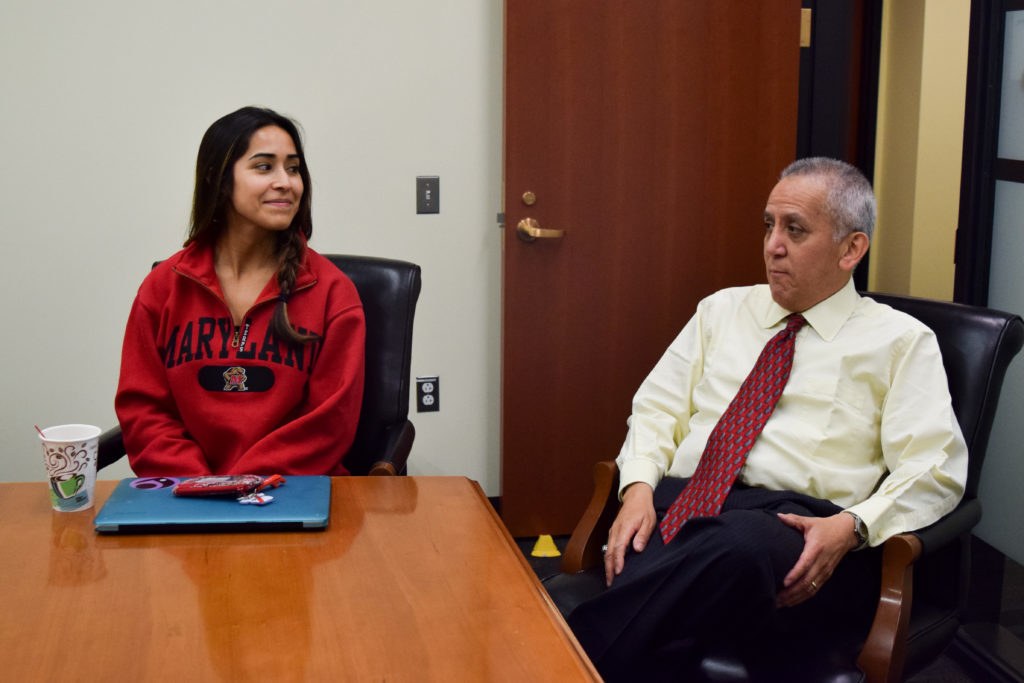As international students across the country grappled this week with the fallout from President Donald Trump’s immigration executive order, a group of law students were bracing to defend undocumented immigrants.
Student-attorneys from GW Law School’s Immigration Clinic arranged to hold information sessions for international students and collect donations to educate the public about what they called a misunderstood immigration system and the potential impact of Trump’s executive order.
The order blocked all refugee resettlement for four months and banned entry into the United States for citizens from seven Muslim-majority countries for 90 days. On Friday, a federal judge temporarily halted the order, reopening the country’s borders to previously blocked travelers and refugees.
While attorneys said no more students than usual have called for legal representation, they were barraged with emails from concerned international students.
The clinic co-hosted a “Know Your Rights” presentation Thursday with the Muslim Law Students Association to offer advice for non-resident students who were concerned about their immigration status.
“We’re trying to be more proactive. I think everybody right now wants to be more proactive and wants to know what can we do,” clinic attorney and law school student Fanny Wong said.
The clinic provides free legal representation for clients who face deportation or are seeking asylum or U.S. citizenship, student-attorneys said. On Tuesdays and Wednesdays, law school students wait by the phone fielding calls from immigrants who need help. Each of the nine law students takes in an average three clients at a time. The length of each case varies, some drag though the legal system for years requiring multiple students to take up the case.
Attorneys said the clinic currently didn’t have any clients from the seven affected countries, but Wong said she had a client from Sudan who became a naturalized citizen in October after a nearly nine-year-long process.
“Can you imagine the situation that she would have been had this been two months ago?” she said. “She’s relieved as well, but she’s also scared for her family and friends.”
To be eligible to work in the clinic, student staff must first complete an immigration law course. Students can earn six academic credits by working in the clinic offers six academic credits and gives law school students a chance to gain practical experience dealing with the pressures and conflicts professional lawyers would face, according to the clinic’s website.
Alberto Benítez, the clinic’s director, said the program helped to provide valuable legal representation for vulnerable clients and offer students valuable real-world experience.
“Our bread and butter has always been representing people, that’s the core mission,” he said. “I like representing people and having young law school students represent people and learn what that’s like. As long as I’m here, that’s going to be the focus.”
Several high-level University officials addressed the ban over the last week including University President Steven Knapp, who said the executive order “directly threatens the well-being of students as well as of faculty and staff members who come from the affected countries.”
The clinic’s attorneys said the past week had taken its toll. Wong said people had made “very erroneous assumptions” about vetting for refugees and unleashed hostility toward immigrants.
“It’s amazing to me how quickly over these past few days, it’s hit me how amazing it is that people turn their backs on their own history and forget about what their own family members have gone through,” she said.
Immigration lawyers became key players in the drama that unfolded at airports across the country a week ago. Attorneys spontaneously showed up at terminals to counsel refugees who had been detained on arrival in the U.S., she added.
“Just to see what was happening at JFK, the protesters, the attorneys coming in droves camping out, setting up shop on tables, on the floors, holding signs offering legal advice if you need it, that was so inspiring to me and to all of us and I think a lot people around the country,” Wong said. “It gave me hope for what’s after law school.”
Attorneys said the program would likely see more cases as a result of Trump’s plans for increased security at the U.S.-Mexico border – than as a result of a travel ban – because many of their clients are undocumented immigrants detained at border crossings.
Student-attorney Celina Marquez said the staff doesn’t know what to expect from the administration’s immigration policy, but certain changes to asylum rules or speeding up deportation cases would impact their work.
“It feels like pandemonium. It’s just a very real sense of fear,” Marquez said. “To me it feels like the calm before the storm because it’s just eerie the way nothing has really happened so far for us at least.”
Most of the student-attorneys come from immigrant backgrounds and several want to pursue immigration law as their careers, they said.
Student-attorney Julia Navarro, the daughter of Argentine immigrants, said the work at the clinic is often difficult but important to the clients.
“Personally, it’s hard but I love this work,” Navarro said. “Since I went to law school I always wanted to help that vulnerable community that definitely needs someone else for them. It’s cliche but they need someone to help them have their voices heard.”




